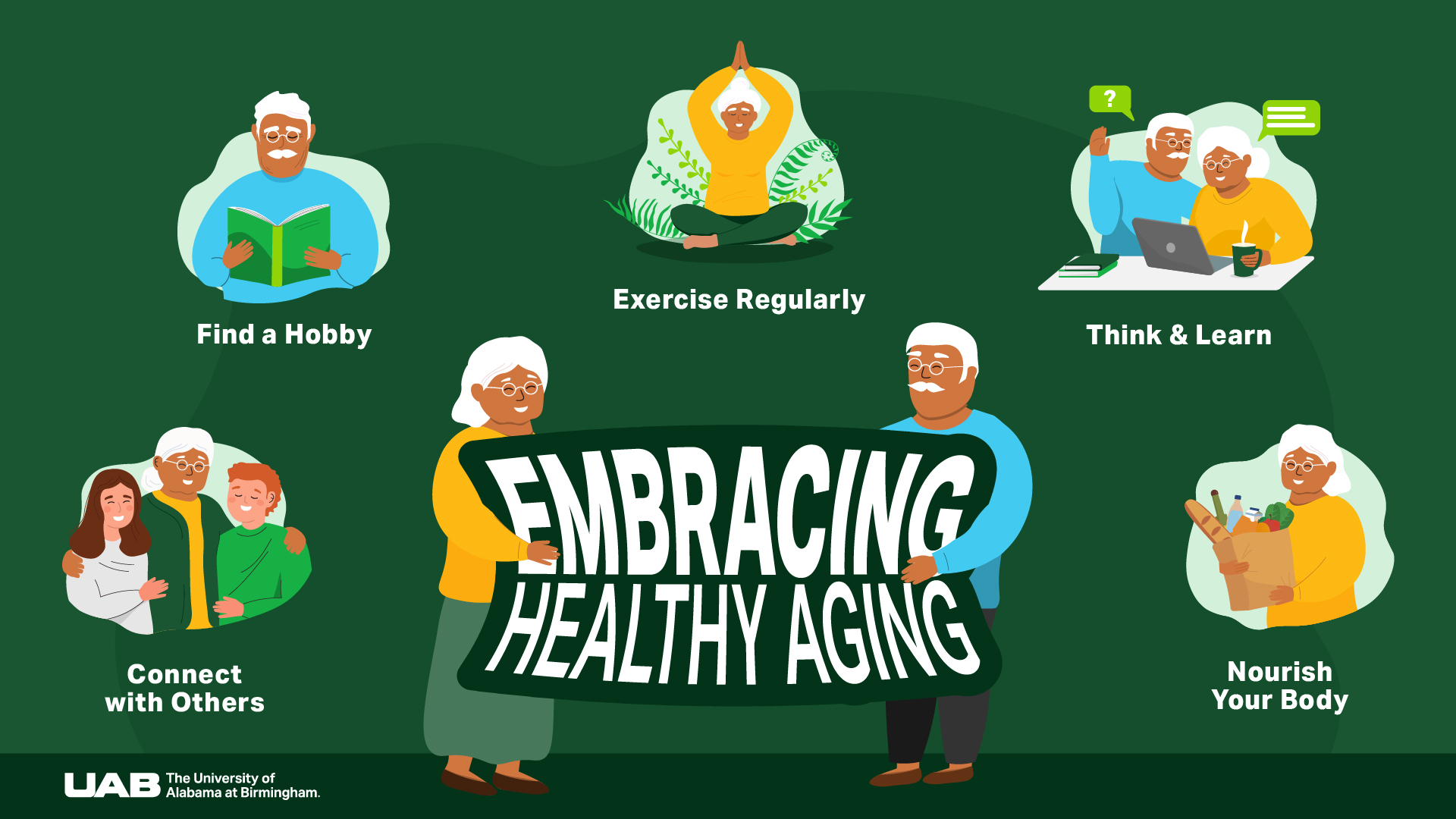
Healthy aging is the process of maintaining good physical, mental and social health and well-being as individuals grow older. While some factors that contribute to aging, such as genetics, are out of an individual’s control, there are many steps people can take to help manage their health as they age.
“One important determinant of healthy aging is remaining independent physically and cognitively as we get older,” said Robert Mankowski, Ph.D., associate professor in the University of Alabama at Birmingham Division of Gerontology, Geriatrics and Palliative Care. “While it is important to take care of your body starting early in life, it is never too late to become mindful of your activity, nutrition, sleep and cognitive function.”
Exercise regularly
Exercise lowers one’s risk of heart disease, diabetes, high blood pressure and some cancers. It can help individuals stay healthy into their older years. Try to aim for at least 150 minutes of moderate exercise per week.
“Being disciplined and consistent can be difficult,” Mankowski said. “For example, if you are not someone who exercises regularly or eats healthy, it may seem intimidating to try to start these behaviors overnight. Given the importance of consistency and discipline, focus on working toward small reachable goals that are sustainable in the long term. These small sustainable changes will add up with time, which will positively influence one’s healthy aging.”
A reachable goal can look like taking the stairs instead of the elevator or walking 10 minutes a day and slowly adding onto that time each week. Try to limit sitting time by standing up for at least five to 10 minutes every hour. As these habits become easier, continue to build upon them each day. To help exercise become more enjoyable, individuals should try to find activities that they enjoy. These could include gardening, swimming, dancing, participating in group fitness classes, or playing sports such as golf, frisbee or tennis.
 When individuals engage in social and productive activities that they enjoy, this may help maintain their well-being and independence as they age. Take an art class, join an adult recreational sports league, or volunteer at a local nonprofit.Identify hobbies
When individuals engage in social and productive activities that they enjoy, this may help maintain their well-being and independence as they age. Take an art class, join an adult recreational sports league, or volunteer at a local nonprofit.Identify hobbies
“Identify a hobby that can involve you physically and mentally,” Mankowski said. “If you do not have a hobby, it is never too late to find one. Start by thinking about your interests and researching different activities that you think you may enjoy.”
When individuals engage in social and productive activities that they enjoy, this may help maintain their well-being and independence as they age. Take an art class, join an adult recreational sports league, or volunteer at a local nonprofit. After determining which hobby to explore, try searching for classes or lessons in the area.
Perform daily cognitive activities
Cognitive health is the ability to think, learn and remember clearly. Cognitive training is designed to improve cognitive abilities. Research shows that cognitive training, specifically focused on memory, reasoning or speed of processing, results in less cognitive decline than those who do not participate in cognitive training. Therefore, Mankowski recommends participating in daily cognitive activities such as puzzles, reading a book, playing complex card games or other activities that present a mental challenge.
Invest in and maintain social relationships
Staying connected with family, friends and neighbors through social activities and community programs can help protect individuals from isolation and loneliness and help support cognitive function. Research shows that regular internet calls could help lower the risk of cognitive decline and social isolation.
There are many ways individuals can strengthen their social connections as they age. Consider volunteering for a local nonprofit, joining an activity group or recreational sports league, or visiting a community or senior center and participating in the activities available.
Eat a healthy diet
Eating a healthy diet can help reduce the risk of obesity and many chronic diseases such as heart disease and diabetes. A healthy diet should consist of whole foods and as few ultra-processed products as possible. Additionally, staying hydrated by drinking a lot of water is essential.
Just like exercising, if switching completely to a healthy diet seems intimidating at first, start with small changes and build upon these changes each day.
“Start with sustainable habits,” Mankowski said. “We know that a diet rich in ultra-processed food is detrimental to our health and thus contributes to unhealthy aging, so maybe the first step could be replacing major ultra-processed foods with whole foods. If this becomes a sustainable habit, maybe the next one could be cutting carbohydrates and having longer non-eating time windows during a day, so we can give our body a break from constant work — food digesting and metabolizing. Focus on lifestyle changes that are going to be easier for you to maintain in the long term.”